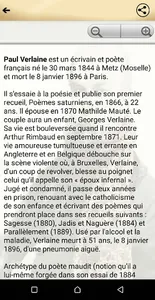These poems were composed, some in prison in Mons, others after captivity; but there reigns throughout the collection a certain unity of tone and atmosphere. The poet makes a painful return to his past (Gaspard Hauser sings), (The sky is over the roof) or listens to the voice of his wife resounding in his ears like an evangelical teaching (Listen to the very sweet song ...) . Ardently, humbly, he seeks wisdom, thinks of the living faith of past centuries and of the fruitful enthusiasm of the builders of cathedrals. He chases away the impure voices of pride, hatred, the flesh, to obey "the terrible voice of love". He offers himself to God, to the Virgin Mary; and he reproduces in a series of admirable sonnets the dialogue of Man with his God.
When Verlaine self-publishes this new book, he hasn't published anything for seven years. During his stay in prison (1873-1875), he had prepared a collection which was to be called Cellulairement. After his release he gave up publishing it and incorporated it into various collections. Seven of them appear in Wisdom.
At the beginning of 1880, the Petite Paroisse farm in Juniville was for sale, Verlaine called on his mother who bought it. The Létinois family settled there. Verlaine rents a house 100 meters from the farm, opposite the Auberge du Lion d'Or. In this very busy inn, Verlaine will finish writing "WISDOM". He lays down the first verses of "Jadis et Nagère".
In 1881, Sagesse" was self-published by the Société Générale de Librairie Catholique and Verlaine's name finally became famous.
When Verlaine self-publishes this new book, he hasn't published anything for seven years. During his stay in prison (1873-1875), he had prepared a collection which was to be called Cellulairement. After his release he gave up publishing it and incorporated it into various collections. Seven of them appear in Wisdom.
At the beginning of 1880, the Petite Paroisse farm in Juniville was for sale, Verlaine called on his mother who bought it. The Létinois family settled there. Verlaine rents a house 100 meters from the farm, opposite the Auberge du Lion d'Or. In this very busy inn, Verlaine will finish writing "WISDOM". He lays down the first verses of "Jadis et Nagère".
In 1881, Sagesse" was self-published by the Société Générale de Librairie Catholique and Verlaine's name finally became famous.
Show More











